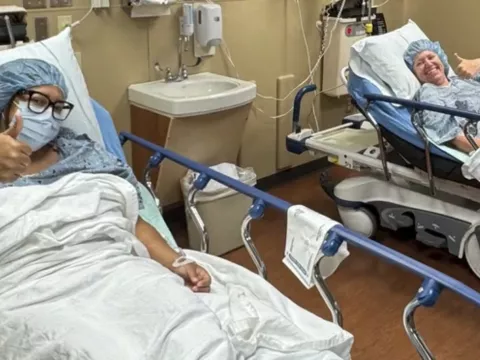- Matthew Gomez
Choose the health content that’s right for you, and get it delivered right in your inbox.

As we prepare for spring, Dr. Mark Soliman, chief of colorectal surgery for AdventHealth’s Digestive Health and Surgery Institute, advises men and women to get screened for colorectal cancer.
During a recent appearance on Fox 35 Orlando Healthwatch to mark March as Colorectal Cancer Awareness Month, Soliman emphasized a sense of urgency for screenings as a key weapon to help stave off the development of colorectal cancer. Registrations are available online at GetScreenedToday.com.
“Everyone needs to get screened, universally, men and women at 45-years-old with African-Americans starting screenings around 40,” Soliman said.
If you are experiencing symptoms or have a family history of colorectal cancer, Soliman recommends starting screenings even earlier, such as five years before a family member was diagnosed with colorectal cancer, or at the onset of symptoms (such as change in bowel habits or bleeding).
As with many cancers, catching colorectal cancer early typically minimizes the negative effect the cancer can have on the body. “An ounce of prevention is worth a pound of cure,” Soliman said.
There are several options for getting screened, including what Soliman called “the gold standard” – optical colonoscopy, in which you drink a special solution or take a few pills to cleanse yourself before going for the colonoscopy. There’s also a DNA test that can be done via stool samples, imaging tests such as Compute-tomography(CT) colonography, or a hybrid of imaging and scopes. The bottom line is to get in to see your doctor to discuss what the best option, among many, may be to prevent colon cancer.
“Lots of times we are able to offer curative therapy through the colonoscopy,” Soliman said. “We can get these early-stage cancers taken care of just by polypectomy alone. If, God forbid, further treatment is needed, we can often offer minimally invasive options to get you back to your life relatively quickly.”
Recent News
The Inspiring Wholeness podcast explains how to start an exercise routine, stay motivated and build endurance safely, to find your inner Ironman.
As the world rang in 2025, AdventHealth for Women welcomed the very first babies of the new year.
Dr. Joseph Lopez, chief of pediatric head and neck surgery at AdventHealth for Children, was honored with the prestigious Professional of the Year Award at the 27th Annual Don Quijote Awards.
Giving back to his hometown, Dr. Ryan Day brings advanced robotic surgery to local patients, offering life-saving care close to home.
The holiday season can increase heart attack risks due to overindulgence, stress, and ignored symptoms, but Dr. Hector Lozano advises moderation, staying active, managing stress, and sticking to...
Transplant is AdventHealth Transplant Institute’s 5000th kidney transplant
Deputies from local fire and police departments dressed as elves and dropped in to visit patients as part of an eight-year long tradition bringing festive cheer to kids and families staying at the...
AdventHealth is now using a fluorescent dye that lights up cancer cells during surgery, which is providing faster, more accurate treatment for patients.
On the newest Inspiring Wholeness podcast, Obie Diaz, local morning radio show host, shares how a routine physical eventually led to two open heart surgeries.
Inspired to change statistics around Black maternal deaths, AdventHealth for Women's Fourth Trimester Program offers enhanced postpartum care for Black mothers with high blood pressure.
AdventHealth University and Jobs Partnership Build Health Care Workforce Pipeline from Underserved Communities.
New LifeWorks Program provides health care workforce training to under-skilled job seekers throughout Central Florida.











